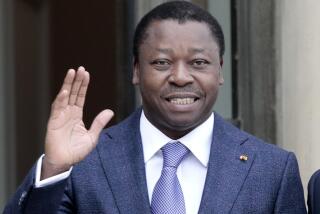Montenegro Rejects Moves by Milosevic to Add Power
PODGORICA, Yugoslavia — Lawmakers today backed the Montenegrin government’s decision to reject changes to the constitution--amendments aimed at concentrating power in the hands of Yugoslav President Slobodan Milosevic while reducing Montenegro’s status.
The marathon session was called by the government to plot its future after Yugoslavia’s parliament changed the federation’s constitution Thursday. Marked by insults between pro-independence and pro-Yugoslav camps, 35 of the parliament’s 53 representatives voted in favor of the resolution adopted Friday by the Montenegrin government. The other deputies in the 78-member legislature were not present or abstained.
The session, which lasted more than seven hours, revealed the deep divisions between supporters of Milo Djukanovic, Montenegro’s pro-Western president, and those who stand behind Milosevic.
Montenegro and the much larger Serbia are the only republics left in the federation since it splintered in the 1990s.
Despite threats to begin steps toward independence, Montenegrin officials declared the changes “illegal, illegitimate . . . and unacceptable,” but stopped short of making moves toward breaking away, which would risk military intervention by Milosevic.
Instead, the resolution appealed for “the citizens of Montenegro, Serbia’s democratic public and the international community to contribute to peace, and the members of the Yugoslav army not to be misused against the citizens and the institutions of Montenegro.”
The move is unlikely to change relations within the federation. Montenegro has ignored the Milosevic regime since 1997, when it began its path toward independence.
“The status quo will remain,” Deputy Premier Dragisa Burzan said after the government session.
Montenegro’s pro-Western leadership has slowly been concentrating power in the republic in what is known as “creeping independence.” The only remaining federal institution in the republic is the Yugoslav army.
Under the constitutional amendments, both the Yugoslav president and parliament’s upper house will be chosen in a popular vote.
Montenegro has 600,000 people, compared with Serbia’s 10 million. A direct election of the president and the legislators will limit its influence in the federation, concentrating power in Milosevic’s hands.
More to Read
Sign up for Essential California
The most important California stories and recommendations in your inbox every morning.
You may occasionally receive promotional content from the Los Angeles Times.









